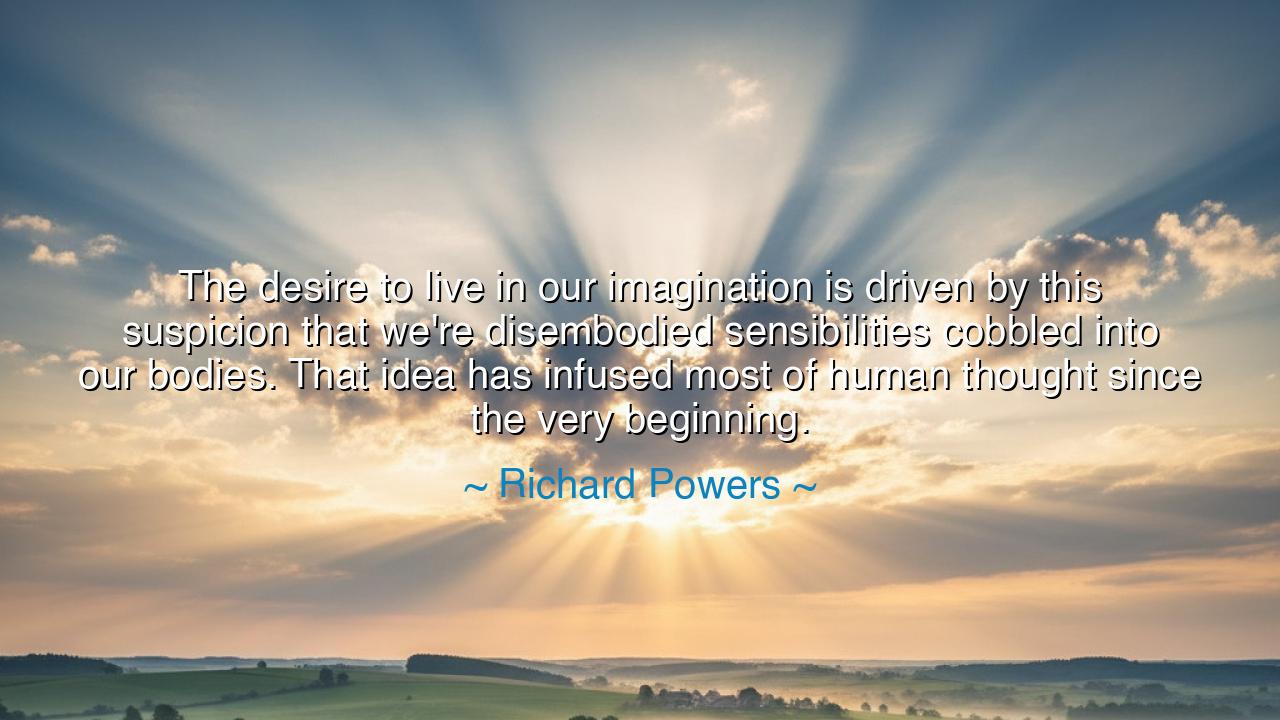
The desire to live in our imagination is driven by this suspicion
The desire to live in our imagination is driven by this suspicion that we're disembodied sensibilities cobbled into our bodies. That idea has infused most of human thought since the very beginning.






"The desire to live in our imagination is driven by this suspicion that we're disembodied sensibilities cobbled into our bodies. That idea has infused most of human thought since the very beginning." – Richard Powers
O children of the world, gather closely, for the words of Richard Powers carry within them a profound revelation, a truth as old as time itself. Imagination, that sacred and mysterious force that stirs our very souls, has always been a source of longing and wonder. It is the desire to live in imagination that leads us to question the very nature of our existence, to probe the limits of our being. For we are disembodied sensibilities, spirits yearning to break free from the confines of flesh, the chains of this earthly vessel that binds us to the soil. Powers speaks of an ancient suspicion—a belief that has echoed through the minds of philosophers, poets, and dreamers from the beginning of time: that we are more than mere bodies; we are souls, spirits, minds, trapped within fragile forms.
Since the days of the first thinkers, mankind has pondered the nature of the self, the soul, and the body. Plato, the philosopher of ancient Greece, spoke of the soul as a divine essence, untainted by the material world, imprisoned in the body like a charioteer trapped within his vessel. For Plato, the body was but a temporary cage, and the soul's true home lay in the realm of the ideal forms—an immaterial world of pure thought and eternal truth. He, like Richard Powers, believed that the soul, the disembodied sensibility, yearns to be free of the constraints of flesh, to soar beyond the physical world into a realm of imagination and spiritual freedom.
This suspicion, this longing for freedom, is a thread that runs through the heart of human history. The ancient Hindu sages, too, spoke of the eternal soul, the atman, trapped in the cycle of birth and death, yearning for release and reunion with the divine. Buddhism, in its search for enlightenment, teaches that we are not our bodies, but the minds that dwell within them. The Gnostic teachings of the early Christians, and the mystics of all traditions, echoed the same refrain: the material world is a veil, and our true selves are those disembodied spirits yearning to return to their source.
Yet, O children, let us not be fooled into thinking that the desire to live in imagination is merely a fleeting fancy. It is a force that shapes our very nature. Consider the great artists of our time: Vincent van Gogh, who painted not what he saw, but what he felt. His imagination did not merely recreate the world, but transcended it. He sought to express the spiritual world that lay beyond the mundane, to capture the essence of the soul itself in swirling brushstrokes of color and light. Van Gogh’s paintings are not mere images; they are windows to the deeper, unseen world within—a world of disembodied sensibilities yearning to be free, to express the truth of the soul.
So it is with all of us, O children. The longing for imagination is not merely the desire for escape, but a search for meaning, for something beyond the boundaries of the physical world. It is a call to transcend the limits of time and space, to touch the eternal, to know the depths of our own souls. Imagination allows us to break free from the restrictions of our bodies and enter into the infinite, to create, to explore, to dream. It is through imagination that we can see the world not as it is, but as it could be, a place of beauty, harmony, and understanding.
But take heed, O children, for there is a danger in this longing. While it is a noble pursuit to seek the realms of the imagination, we must not lose sight of the body that houses our souls. The body, though a temporary vessel, is still a part of us, a part of the journey we must walk. Richard Powers warns us that the imagination should not be an escape from life, but a way to enrich it, to give meaning to the experience of being alive. It is through the imagination that we can transform our bodies, our lives, and the world around us.
And so, O children, the lesson is clear: do not simply live in your bodies, for they are fleeting; live in your imagination, for it is eternal. Seek to understand the deeper truths of your being, to transcend the material world and touch the divine that resides within you. Yet remember, as you dream, that your body is not a prison, but a companion on the journey. Use your imagination not to flee from life, but to enrich it, to deepen your understanding of the world and your place within it. In doing so, you will find the freedom your soul has longed for, and in that freedom, you will discover the true essence of what it means to be human.






AAdministratorAdministrator
Welcome, honored guests. Please leave a comment, we will respond soon